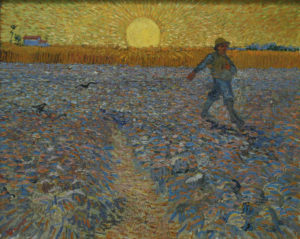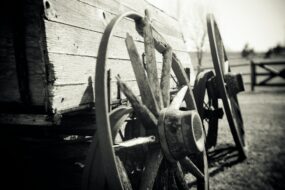July 27, 2019 • Life for Leaders
Other seed fell into good soil and brought forth grain, growing up and increasing and yielding thirty and sixty and a hundredfold.
Mark 4:8 (NRSV)

The Sower, June 1888, Vincent Van Gogh, Kröller-Müller Museum, Otterlo. Van Gogh made several similar paintings inspired by Jean-François Millet’s The Sower.
A Jewish friend once told me that the intent of the Hebrew Scriptures is to raise questions rather than to provide answers. That’s something I’ve pondered ever since. I have to admit that I spent much of my life looking to the Bible for answers rather than questions. In contrast, Jesus often teaches much the way my friend viewed his Hebrew Bible. People regularly leave puzzled by Jesus’ words. Immediately after this parable, Jesus’ disciples ask him what it might mean. Not surprisingly, Jesus responds with a series of questions, “Do you not understand this parable? Then how will you understand all the parables?” (Mark 4:13)
Today’s text describes the seed falling into good soil. So, what makes the soil good? As our last set of reflections suggested, part of the answer lies in our giving conscious, sustained and disciplined attention to Jesus’ way of life and leadership. However, this is not merely an exercise in acquiring leadership knowledge or technique. Jesus’ teaching challenges us at the core of our being as leaders. Perhaps that’s why questions are so important. In the imagery of this parable, questions have the potential to create the depth of soil that allows the seed of Jesus’ teaching on the vocation of leadership to take adequate root. The puzzlement of the disciples at Jesus’ teaching mirrors our own. And, more importantly, Jesus’ conversation with his disciples models the importance of wrestling with the questions Jesus’ teaching raises in the context of our own work.
Learning to create space for questions in our leadership is challenging. We live in a world that demands quick responses. The pace of life in the 21st Century makes genuine reflection difficult. Part of Jesus’ counter-cultural challenge is to make sure we have the resolve and the resources to bear good fruit in our leadership. As the parable’s three inhospitable categories of soil remind us, it’s easy to get it wrong. The purpose of the De Pree Center’s Life for Leaders devotionals is to provide a resource to help you create just this kind of personal, daily reflective space. Taking time individually to hear God’s word and to submit our leadership work to the questions it raises is one practical way to develop good soil.
Another way is to cultivate discerning voices in the people around you. Leadership can easily silence voices that raise uncomfortable questions. One of the risks of power is to marginalize needed perspectives in the interest of “getting things done”. Mihaly Csikszentmihalyi, a leading psychological researcher on flow and creativity, has said, “It is good to be quick and consistent. But if you wish to be creative you should be willing to run the risk of sometimes seeming indecisive.” (Creativity, p. 367) Being thought of as indecisive is as difficult for me as a leader, as I suspect it is for you. We don’t want to lose our credibility as leaders by appearing uncertain. Yet, there are times when we need to create space for communal debate for the common good, even at the price of our reputation as decisive leaders.
In the end, being good soil means allowing the seed to fulfill its purpose. In that regard it’s worth noting that there are two kinds of uses for seeds. One use is to make something that can be appreciated and enjoyed for its own sake – for example, grains of wheat ground into flour to make bread. We regularly (and rightly) give thanks for that kind of seed. But there is another, darker purpose for seeds, one which Jesus focuses on in this parable. That darker work finds its fulfillment not through the seed’s life but through its death. As Jesus himself says, “Very truly, I tell you, unless a grain of wheat falls into the earth and dies, it remains just a single grain; but if it dies, it bears much fruit.” (John 12:24)
The harvest of Jesus’ life has seeds of both kinds. The gospels provide ample stories and images of Jesus living out a flourishing human life. In reading them, it is easy to get the sense that this is the way human beings were meant to live and to lead. This is what a fruitful life looks like. But strangely, the most consequential aspect of his leadership lies not in his life but in his death.
So it is with us and with our vocation as leaders. It is easy to merely see the fruits of our leadership as that which can be appreciated and enjoyed – thriving businesses, non-profits and government agencies that serve the common good, and the healthy communities that result. Indeed, those are good results of good soil. But, it is easy to forget the way those good results come about. In the imagery of this parable, for there to be a harvest, seeds must die so that a hundredfold might be produced. So in our lives, while we should be grateful for the hundredfold harvest, we should be even more grateful for the seeds that die to make the harvest possible.
We are, of course, most grateful for the singular seed, the death of Jesus on all our behalf which brings in not just a hundredfold harvest but “a great multitude that no one could count.” (Revelation 7:9). But also in our own leadership, we should value the dark places of suffering where we lay down our lives for those we lead. For in those places and times, we become both good soil and good seed which will “bear much fruit.”
Something to Think About:
What aspects of Jesus’ teachings on leadership puzzle you? What questions do they raise for you? What troubles you about them? Why might that be?
Who in your circle of colleagues and friends ask the most challenging questions? How do you engage them and the questions they raise? In what ways might you cultivate your relationship with them?
What are examples of fruitfulness in your leadership? How have occasions of suffering in leadership contributed to the fruit of your work?
Prayer:
Lord Jesus Christ, we are grateful that you spare nothing in your love for us. You have not spared your own life and suffering, and so we know that you will not spare us the needed suffering that brings forth the harvest you intend in our lives. We confess that we are often uncomfortable with the questions you raise and the suffering you call us to take up.
Thank you for your Spirit who sustains and encourages us, and who strengthens and emboldens us to embrace this strange vocation of being a lead servant to which you have called us as human beings. Give us grace to follow you in life and in death.
We ask in your name and for the sake of the world that you love. Amen.
Image by Vincent van Gogh – own photo in the Kröller-Müller museum, Public Domain, Link
Explore more at the Theology of Work Project online commentary: Parables at Work (Mark 4:26-29 and 13:32-37)

During his adult life, Uli Chi has lived and worked in the intersection between business, the academy and the church. He has had the privilege of serving as past Board Chair of Regent College in Vancouver, BC, as current Vice Chair of the Board of the Max De Pree Leadership Center at Fuller Seminary, and as current Chair of the Executive Committee of the Center for Integrity in Business at Seattle Pacific University. He has also been involved in all aspects of local church leadership, including as a member of the adult ministries team’s teaching faculty at John Knox Presbyterian Church in Seattle.
Click here to view Uli’s profile.





I have read the “Parable of the Sower” many times. I never considered the importance of answering questions. It makes sense. Questions quicken our desire for knowledge–knowledge of ourselves, others, and God. Questions compel us to seek after and to draw closer to the One asking the questions. They also help develop that knowledge and understanding of Christ and His ways. Our minds are renewed. We forsake the wisdom of the world for the higher thoughts of God. Over time, our worldly mindset is replaced with a Kingdom mindset.The world and our own ego often craves fast answers because we want fast solutions. But the Word warns us that wisdom is rarely found in haste. Cultivation of good soil and good fruit takes time. Asking and answering questions forces us to take the time–to engage in the process of learning and becoming a servant leader that reflects Jesus. It’s the process that often prepares our heart to let the seeds of self, fear, and rebellion die, so that sacrifice, courage, and obedience to God’s call and direction can bring fruitfulness to our lives.
The Parable of the Sower is a parable I heard many times growing up. From the perspective of Judaism I find it interesting that this parable and all of scripture serves to invoke more questions than provide answers. This is an interesting take on scripture as very few people delve into the Bible with the mindset of coming out more confused and with more questions but I don’t believe this is necessarily a bad thing. Confusion and lack of resolution often breeds the need for deeper discovery and end in higher platitudes. Questioning and often difficult questioning compels us to seek after Christ and often is the catalyst to a more mature and bonafide faith. A more bonafide faith is what Christ wants from us in order to bear good fruit.
Christ uses this parable to explain how there are different responses to the saving Gospel and who bears good fruit. The sower in the parable is Christ and the seed is the Word. The hard ground represents someone with a hardened heart full of sin that hears the word of God but does nothing to accept it. The stony ground is someone who shows some interest in the Gospel yet their heart isn’t fully convicted so when trouble comes their faith is not strong enough to stand the storms of life. The thorny ground is a person who receives the Gospel but who has many other idols and distractions in life like money, status and ego which takes over their mind and they cannot grow in the truth of the gospel. The good soil though is someone who has heard and received the Word of God and allows it to take root and grow purposely in their lives. This person represents true salvation and thus bears good fruit. I think it behooves us christian business people and leaders to be aware we are to bear good fruit with our actions and choose to lead renewed lives in the workplace and in our communities.